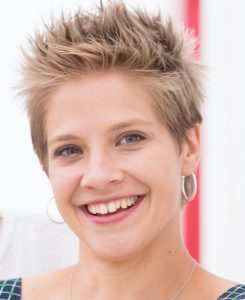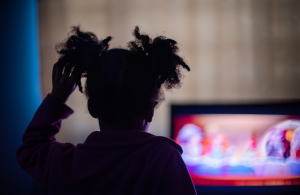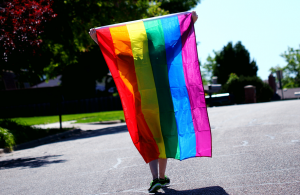Key Research Questions
- How do ideas about pluralism, diversity, and tolerance travel around the world?
- How are they adapted, appropriated, or resisted in new contexts?
- How do governments and international actors use education and media to “manage” diversity and build peace?

Naomi A. Moland, PhD
Naomi A. Moland is a scholar of cultural globalization, international education, global media, and peace and conflict. She earned her Ph.D. in International Education from New York University, her M.Ed. in Curriculum and Instruction from Arizona State University, and her B.A. in Anthropology from Tufts University. Before coming to American University, Moland taught at Teachers College- Columbia University, Lang College- The New School, and in public elementary schools.
While Moland’s approaches are multidisciplinary, she draws primarily from anthropological theories and methodologies. She is currently working on two projects, one about educational media and peacebuilding, and one about global LGBTQ rights. Her data for these projects is primarily qualitative, in the form of ethnographic observations, interviews, and textual and media analysis. Moland has conducted research near the Mexico-U.S. border, and in Spain, Ghana, Zimbabwe, and Nigeria.
Research Projects
Educational Media, International Development, and Peacebuilding
 For nearly a decade, Moland has been investigating how international organizations use educational media to promote tolerance and build peace. Governments and international organizations frequently prescribe education as a solution in conflict-affected societies, but we have limited knowledge about how such initiatives play out in different contexts. As a case study, Moland examined the Nigerian version of Sesame Street, called Sesame Square, which is funded by the United States Agency for International Development (USAID). Her findings from this research reveal that peace education initiatives face different obstacles in deeply segregated societies where state fragility and ongoing conflict persist. Multicultural education approaches that have been developed in more stable Western countries carry different risks in such contexts. In societies currently experiencing conflict, educational approaches may need to emphasize unity and hybrid identities in order to avoid further divisions. Moland’s new book on this research, “Can Big Bird Fight Terrorism?: Children’s Television and Globalized Multicultural Education” was published by Oxford University Press. Read more about the book here.
For nearly a decade, Moland has been investigating how international organizations use educational media to promote tolerance and build peace. Governments and international organizations frequently prescribe education as a solution in conflict-affected societies, but we have limited knowledge about how such initiatives play out in different contexts. As a case study, Moland examined the Nigerian version of Sesame Street, called Sesame Square, which is funded by the United States Agency for International Development (USAID). Her findings from this research reveal that peace education initiatives face different obstacles in deeply segregated societies where state fragility and ongoing conflict persist. Multicultural education approaches that have been developed in more stable Western countries carry different risks in such contexts. In societies currently experiencing conflict, educational approaches may need to emphasize unity and hybrid identities in order to avoid further divisions. Moland’s new book on this research, “Can Big Bird Fight Terrorism?: Children’s Television and Globalized Multicultural Education” was published by Oxford University Press. Read more about the book here.
Cultural Dynamics of Global LGBTQ Rights Movements
 In recent years, the global movement for human rights for Sexual Orientation and Gender Identity and Expression (SOGIE) minorities has intensified—as has backlash to this movement. Moland has begun research on how activists around the world draw on global LGBTQ rights ideologies and “localize” them into particular contexts. She is working with her colleague Oren Pizmony-Levy , who conducted a large-scale online survey of LGBTQ Youth-Serving NGOs around the world. In a qualitative follow-up to this study, Moland and her team interviewed 40 SOGIE activists from 38 countries, in order to learn how they “indigenize” LGBTQ rights discourses to be relevant in their societies. These activists describe their educational strategies to convince members of their society that homosexuality is not “against” their culture and/or religion—a common belief in many countries especially in Sub-Saharan Africa, Eastern Europe, and the Middle East/ North Africa. Moland and her colleagues have presented their findings at the Comparative and International Education Society conference and published an op-ed on these themes, and are seeking funding to conduct further research.
In recent years, the global movement for human rights for Sexual Orientation and Gender Identity and Expression (SOGIE) minorities has intensified—as has backlash to this movement. Moland has begun research on how activists around the world draw on global LGBTQ rights ideologies and “localize” them into particular contexts. She is working with her colleague Oren Pizmony-Levy , who conducted a large-scale online survey of LGBTQ Youth-Serving NGOs around the world. In a qualitative follow-up to this study, Moland and her team interviewed 40 SOGIE activists from 38 countries, in order to learn how they “indigenize” LGBTQ rights discourses to be relevant in their societies. These activists describe their educational strategies to convince members of their society that homosexuality is not “against” their culture and/or religion—a common belief in many countries especially in Sub-Saharan Africa, Eastern Europe, and the Middle East/ North Africa. Moland and her colleagues have presented their findings at the Comparative and International Education Society conference and published an op-ed on these themes, and are seeking funding to conduct further research.
My Road to International Studies
I have always loved learning about different people from different places. I come from a very musical family, and my interest in Africa sprouted when I began studying African music at Tufts University. While studying music in Ghana and Zimbabwe as an undergraduate, I became interested in how schools—which were modeled after British schools—taught about Ghanaian and Zimbabwean culture, and how they addressed the countries’ colonial pasts. After Tufts, I joined Teach For America to learn about how our educational system addressed issues of immigration and multiculturalism. I taught recent Mexican immigrants in Phoenix for five years, and then received a Fulbright grant to study similar issues in public schools in Madrid, Spain. When I began my doctoral program at NYU, I wanted to conduct comparative studies of how educational initiatives address diversity, and I landed on international versions of Sesame Street as a fascinating example of a globalized multicultural curriculum that is localized into different contexts. The path to my current teaching and research interests has been a winding one, but I have always been fascinated by how cultures interact and evolve.
